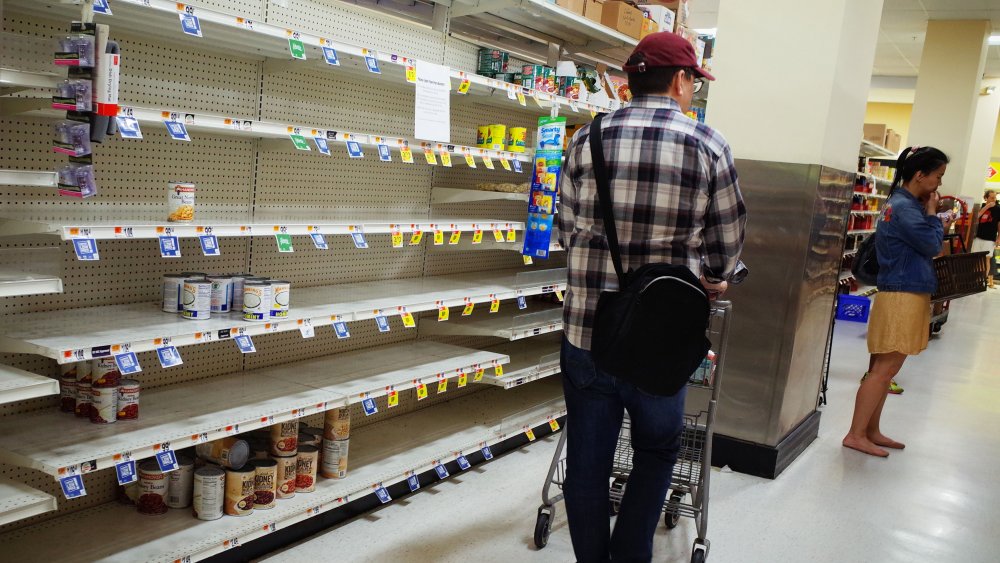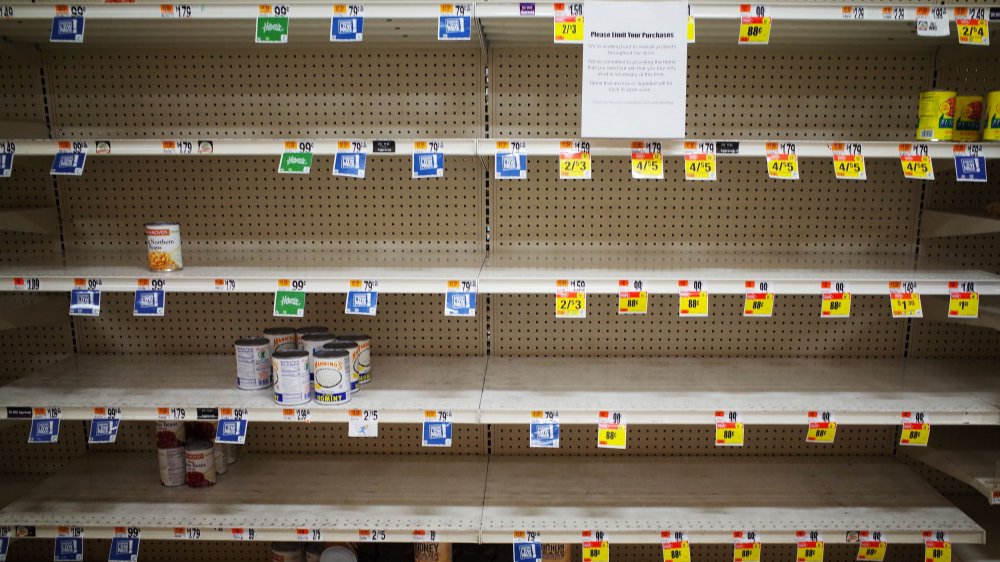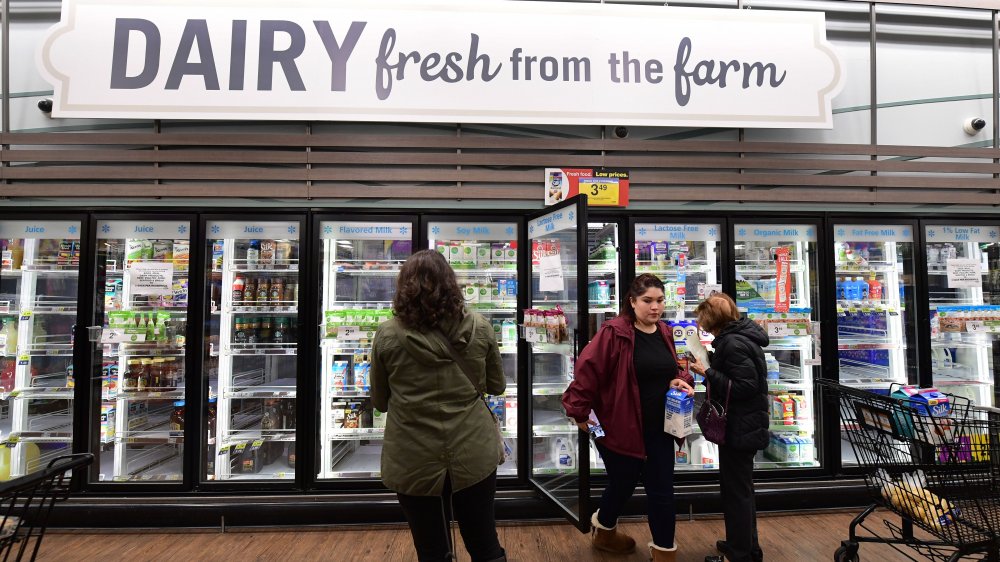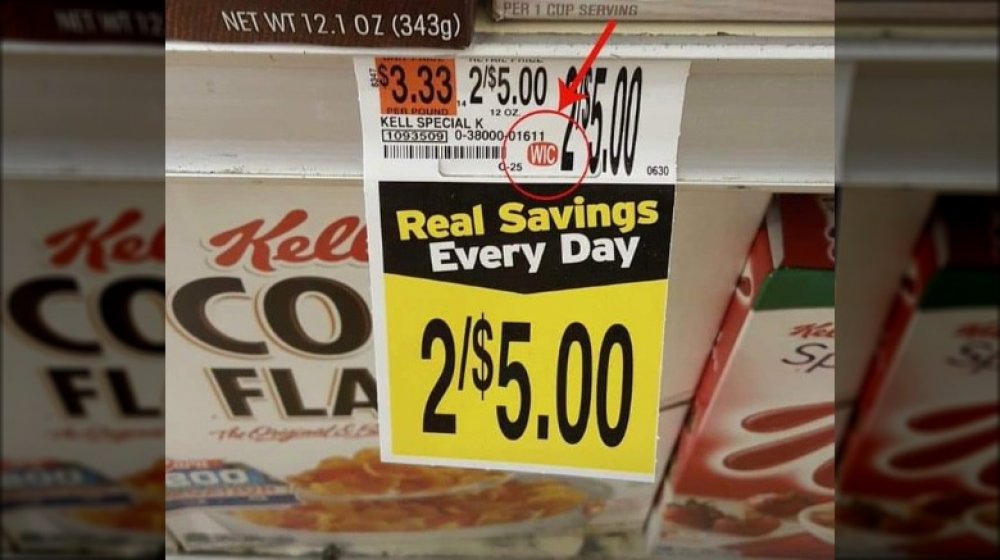The Reason You Should Avoid Buying These Grocery Items During The Pandemic
Quarantining at home has pushed people to stock up on supplies and buy pantry essentials in bulk. While there are foods you'll wish you had when you're self-isolating at home, there are also foods you should avoid buying during your next trip to the store — because purchasing them can prevent others in need from getting the groceries necessary to feed themselves and their families.
Namely, those enrolled in the WIC (Special Supplemental Nutrition Program for Women, Infants and Children) program have limited options when shopping. The initiative was designed to provide supplemental foods and nutrition education to "low-income pregnant, breastfeeding, and non-breastfeeding postpartum women and children up to the age of five" (via The Daily Meal). Unlike those who receive SNAP (Supplemental Nutrition Assistance Program) benefits, WIC recipients can only use their benefits to purchase from a range of specific food items that supplement their health (via The Oregonian).
WIC participants can only purchase authorized foods, which were specifically chosen for their nutrients. According to a fact sheet from the United States Department of Agriculture, the program provides funds for the purchase of essential nourishment for infants (such as baby foods and iron-fortified formula) and basic foods important for a balanced diet — eggs, milk, cheese, fruits, vegetables, peanut butter, tofu, canned fish, whole-wheat bread, and other items.
Avoid WIC tags when shopping during the pandemic
If you've never needed government assistance when shopping for groceries, you might not be aware of how the WIC program distinguishes approved items. The key is to look at the shelves. Foods covered by the initiative are often labeled with shelf tags that say "WIC" or "WIC approved food." When those marked items are all gone and the store has no substitute to offer, program recipients can't get food, even though they have WIC funds (via Hello Giggles).
Lindsey Keefauver, a mother of two who uses WIC benefits, told CBS Sacramento that when she makes it to the grocery store, she is only able to buy certain foods, but as of late, finding food for her family has been difficult. This is an issue echoed by other WIC participants who have had their benefits expire after coming up empty when shopping. Once these benefits expire, they're just gone, period.
Families like Keefauver's have been imploring those who aren't reliant on the program to pay special attention to the WIC sticker and avoid those food items when grocery shopping.
How government officials are helping WIC shoppers
Local officials have been joining WIC-dependent families' cries for help. Adam Medrano, a city council representative from Dallas, asked the general public in a Facebook post to stay away from local grocery stores April 1 to 3 if there is no critical reason for doing so. He made this request in order to allow low-income families to redeem their WIC benefits, which are renewed at the beginning of each month, and get the food supplies they are desperately seeking. He also told people to not buy items with a WIC shelf tag, unless there is an absolute need (via Eater Dallas).
A USDA spokesperson informed BuzzFeed News that states can change their list of WIC-approved foods at any time, as long they meet federal standards. The spokesperson also stated that with the recently-passed Families First Coronavirus Response Act, states can begin requesting waivers that would loosen restrictions and allow for additional substitutes. These waivers would enable WIC recipients to buy different brands and sizes of food items. However, they are still limited to the foods that are approved by their states.
Social media is bringing awareness to WIC
The call to attention for avoiding WIC items has become a national one, with many taking to social media to bring awareness. Suit Up Maine, a grassroots political organization, tweeted a photo of a WIC shelf tag and asked others to get something else if an item has the WIC symbol next to its price. The group also followed up by elaborating that the color, size, or font of the WIC label might be different from the image it shared, but most national grocery chains have a system for marking those items (via Today).
The tweet from Suit Up Maine went viral — catching the eye of Little Fires Everywhere actress Kerry Washington. She shared the photo on Twitter and asked her 5.3 million followers to avoid WIC products when stocking up on quarantine supplies. Washington's tweet struck a chord with singer Janelle Monáe, who retweeted the image with this message: "I was a WIC baby. PLEASE read labels."
So when you hit up the supermarket to buy more groceries next time, be sure to check the shelf tags.



